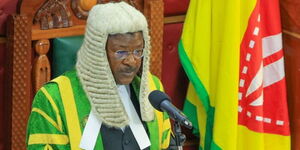The Health Cabinet Secretary, Aden Duale, has affirmed that the government will not backstep in the crackdown against hospitals abusing Social Health Authority (SHA) funds, a day after the World Bank called for adjustments to the medical scheme.
In a report released on Tuesday, May 27, the World Bank called for a review of both the rollout and the approach to funding the programme.
Duale, who spoke during a press briefing on Wednesday, May 28, asserted that the regulatory authorities led by the Kenya Medical Practitioners and Dentists Council (KMPDC) will continue to weed out noncompliant and fraudulent health facilities and workers to streamline the medical scheme.
The health boss claimed that on Saturday, June 14, he will expose the names of all previously contracted under the former National Health Insurance Fund (NHIF) who are implicated in fraudulent activities through a list he dubbed "the list of shame".
According to Duale, the ministry has already closed down and downgraded several health facilities that were involved in the fraudulent activities.
"For thousands of health facilities in our country that were involved in fraud in the defunct NHIF, a number of them have been closed and downgraded, and we will share the names with Kenyans soon," Duale said.
"I want to emphasise that healthcare providers in the country must either live by the law. You cannot open facilities with no healthcare workers and performing surgeons that don't exist. I have a whole list of them, county by county," he added.
Duale has further claimed that the Ministry of Health has engineered a new system, Track and Trace, that has the ability to track non-compliant health facilities and medical personnel.
The move, according to Duale, will be fundamental in elevating the country's healthcare ecosystem and propelling the country towards Universal Healthcare Coverage (UHC).
"When we are done with everything, very few health facilities and workers in our country, with high integrity who care about the well-being of their patients, will be found in Kenya," the CS said.
In its report under the theme Public Finance Review (PFR), the World Bank further urged the government to reinforce the country's health system capacity and equity by addressing staffing shortages and ensuring the availability of key supplies and equipment, especially in underserved regions of the country.
Additionally, the lender urged the government to exempt low-wage earners in the formal sector from SHIF contributions, in addition to fully funding the exempt low-wage earners in the formal sector from SHIF contributions.
In a statement on Tuesday, May 20, the KMPDC CEO, David Kariuki, announced the closure of 511 substandard healthcare facilities in Mandera (58), Nairobi(376), and Wajir (77) counties following the assessment of 1,525 in the counties.
Kariuki further claimed that the council had downgraded 267 other health centers due to their inability to provide the full range of services they were registered for.
KMPDC claimed that the facilities had insufficient infrastructure, poor sanitation and environmental conditions, including inadequate water supply and improper waste disposal systems, and unregistered medical personnel, which contravened the council's regulations. KMPDC further noted that the violations pose significant risks to patient safety.
The downgraded facilities, on the other hand, were found to lack the necessary medical supplies, have non-functional equipment, or have insufficient qualified personnel, including doctors, clinical officers, nurses, laboratory technicians, and pharmacists.












